Robert Knox's Blog, page 14
March 17, 2019
The Garden of the Seasons: Winter into Spring -- Those Back-and-Forth Days in the Changeable Month of March
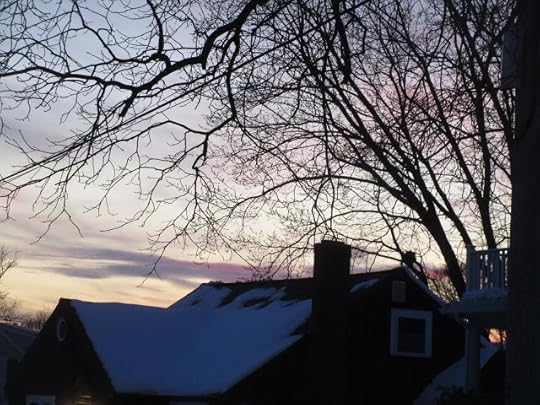
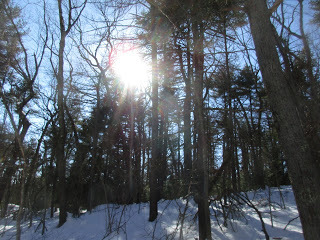 A beautiful light in the late afternoon glows in the windows today (Saturday, March16), making me desire to go back outdoors and stare at the world. We have already done a good deal of staring, and looking, and traipsing around in the Blue Hills Reservation today, catching the park in one of its late season undressings. Change is underway. Last week's snow cover has largely melted into once frozen ground, offering slush and some mud-season conditions on what are otherwise clear and well trod paths from the blows of thousands of feet over scores of years. Now the feet must rest, even as the eyes may go on feasting.
A beautiful light in the late afternoon glows in the windows today (Saturday, March16), making me desire to go back outdoors and stare at the world. We have already done a good deal of staring, and looking, and traipsing around in the Blue Hills Reservation today, catching the park in one of its late season undressings. Change is underway. Last week's snow cover has largely melted into once frozen ground, offering slush and some mud-season conditions on what are otherwise clear and well trod paths from the blows of thousands of feet over scores of years. Now the feet must rest, even as the eyes may go on feasting.
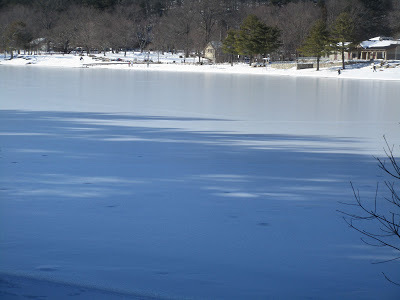 Today's date means we're halfway through the month of March, that most changeable of moons, given its folklorish status as both lion and lamb. How about lollipop? If the crocuses pop open. Lamplight night-owl? If the longer light, seriously extended by early daylight savings tempts you to stay up later. I heard an owl hoot from a very nearby tree after midnight one night last week. Though I have never seen one in this neighborhood.
Today's date means we're halfway through the month of March, that most changeable of moons, given its folklorish status as both lion and lamb. How about lollipop? If the crocuses pop open. Lamplight night-owl? If the longer light, seriously extended by early daylight savings tempts you to stay up later. I heard an owl hoot from a very nearby tree after midnight one night last week. Though I have never seen one in this neighborhood.
 March is the month of first green shoots. Crocuses, blade-like leaves, then budding mouths nuzzling up between the shoots. Of forsythia's yellow, and pale willow green. Of -- when the ice clears out of the drenched forest lowlands -- the sharply fragrant skunk cabbages. Wild, prolific, and done in a month. Of bulging, red buds on the slim branchings and tiny twigs of spring-blooming trees. Of the newspaper photos of cherry tree blossoms looming pink and white on fruit trees in the states south of New England. Especially, it seems in the nation's capital (did Jefferson plant these?), if all the blushing pink in the world has not been consumed by the faces ceaselessly embarrassing themselves in the White House and the Capitol building. March is the season of wind, such as the sudden blast crossing the back garden from north to sough, and then west to east, in the midst of this extravagantly sunlit afternoon.
March is the month of first green shoots. Crocuses, blade-like leaves, then budding mouths nuzzling up between the shoots. Of forsythia's yellow, and pale willow green. Of -- when the ice clears out of the drenched forest lowlands -- the sharply fragrant skunk cabbages. Wild, prolific, and done in a month. Of bulging, red buds on the slim branchings and tiny twigs of spring-blooming trees. Of the newspaper photos of cherry tree blossoms looming pink and white on fruit trees in the states south of New England. Especially, it seems in the nation's capital (did Jefferson plant these?), if all the blushing pink in the world has not been consumed by the faces ceaselessly embarrassing themselves in the White House and the Capitol building. March is the season of wind, such as the sudden blast crossing the back garden from north to sough, and then west to east, in the midst of this extravagantly sunlit afternoon. The season of bird song too, or does my memory deceive me? A few years back I would have sworn that the dawn serenades of the returning, and seasonally reviving, avian chorus were loudest in March. Their instincts are roused by the stronger, longer sunlight, the warming bare ground of the new year's revelation, and by the springlike temperatures.
Temperatures, we're told, are typically averaging in the low to mid forties by these middle days of the month. Bare ground?
I am remembering Marches with no snow on the ground; recent calendars, however. have banished these vernal expectations. Last year the month gifted us with four consecutive visitations of the fierce storms we called northeasters, because that's the direction from which the wind blows strongest on this coast. We were coming home from Florida during one of these on a flight I greatly feared would be canceled. Is this a sign? I asked myself then. Should we not be coming home from Florida to face all this? And then a few years before, the legendary Massachusetts killing winter of 2015, when the snows of late winter rolled steadily through March. And the snow embankments were scarcely off the earth through the month of April. Fat chance for the crocuses; and the daffodils were similarly late as well. This year, after a remarkably snow-free winter. we get our only substantial snowfall in the first third of March, fifteen inches in our town of Quincy. Those fortification-like snowbanks once more lining the streets of the neighborhood. The snowed-in, street-parked cars. The heavy coatings of wet snow melting with thumps off all the branches of all the trees, and sliding off the roofs, days later, with brief avalanche-like frenzies. This is the snow (pictured in the second and third photos above) we found in the Blue Hills Reservation, where we walked last weekend through boot-trodden trails of slush-heavy snow. It had already melted some by then, but you can see it covering the entirely of the broad plain of Houghton's Pond, and on the untouched snowfields where the tree boles and their long straight shadows cross-hatch the earth's white floors. This week 'seasonable' temperatures melted back most of the snowbanks; and a rainy night decreased them further still. The birds (as pictured below) accommodated themselves to a snowy floor and looked for the uneaten seeds spilled from the feeder. And the skies grew rich with the deep blue of the fast-approaching equinox. This week, I think, we will see some of those green sprouts. When it comes, this long-awaited deliverance, the change is always sudden. (Photos below are now-and-then moments from various stages of snow and melt delivered by the stop-and-start seasons of March.)
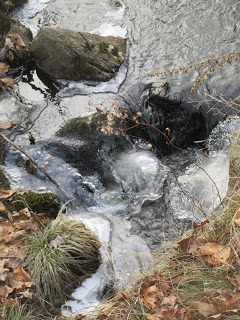
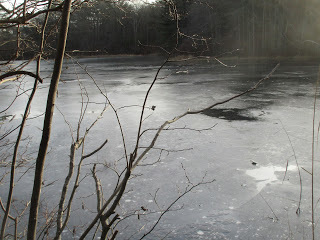


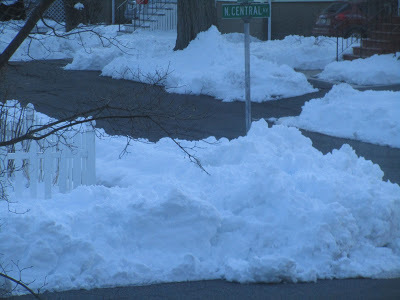
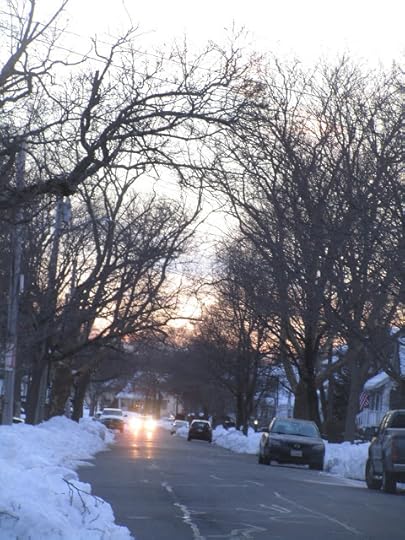
Published on March 17, 2019 11:07
March 12, 2019
Tall Story Time: Two Stories, Two Journals, Two Days
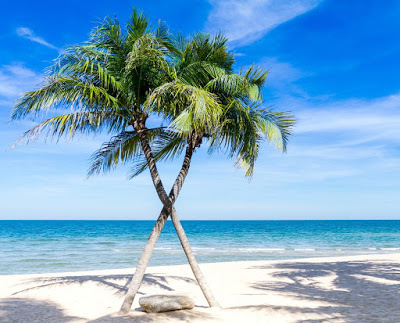 My short story "Post No Bull" begins this way:
My short story "Post No Bull" begins this way: Our first stop, of course, is Charlie’s.
“Do you remember when we used to come here?” she asks, as we contemplate the glass front of Charlie’s Cheap Eats & Saloon.
“No, we didn’t,” I say. “You must be thinking of someone else.”...
She laughs and swats me lightly. “It wasn’t somebody else. I don’t know what you think of me.”
The story is up on the online journal "Carpe Bloom," which has just published its "Issue 7/ Paperguts"
Written a few years ago, "Post No Bull" is a mostly funny story about what happens when a couple of youthful hipsters look for places to put up posters for their free music festival. It's wholly fictional. I am not guilty of any of the offenses recorded therein (though most of them were in my heart). The story was written originally to be part of something much (much) longer, a novel about the follies, and aspirations, of being young. I thought I had to try to capture some of the currents, self-inventions, and ways of living peculiar to a period in every life that leaves its mark, though it passes so quickly -- while, that is, I could still remember something about it. That novel of the inspirations (and perspirations) of youth is still around, and I've lately gone back to reworking pieces. Here is the link to "Issue 7/ Paperguts" below. https://carpebloom.com/issue7paperguts/
My story is the THIRD STORY story down.
Today, March 13, the Potato Soup Journal published another of my short fictions. Titled "Two of Us," this fiction is about as different as can be from "Post No Bull." In that story, the characters were very young, dealing with young people issues -- drugs, nonconformity, building relationships. In "Two of Us," the characters are dealing with the passage of time and looking at eternity.
Again, as in "Post No Bull," none of the events depicted in "Two of Us" took place in my own experience. I have certainly to at least one of these settings, the 'hospital,' and most everyone has been on an 'airplane,' but happily my situation did not resemble that of the male character in this story.... I wrote this story some four or five years ago. Enough time to allow me to see this story from a distance and feel for the characters.
Here's a brief excerpt from the section called "The Hospital."
He stares at the clock over the reception desk. The line moves. An older man approaches the desk accompanied by a young woman with thick dark hair, who proves to be his translator.
It’s more like ten minutes now.
You wanted this, Scott. You wanted me to push you to do this.
I know you believe that. Facing straight ahead, not looking at her.
I believe it because it’s true.
He frowns.
How are you feeling? Is it happening?
Don’t ask. He shakes his head.
She whispers. I know you’re suffering.
You can find the whole story (it's not long; neither of these stories is) at this link:
http://potatosoupjournal.com/two-of-us-by-robert-knox/
Published on March 12, 2019 21:40
Tall Story Time: My Mostly Funny Story "Post No Bull" Is Published in an Online Journal
 My short story "Post No Bull" begins this way:
My short story "Post No Bull" begins this way: Our first stop, of course, is Charlie’s.
“Do you remember when we used to come here?” she asks, as we contemplate the glass front of Charlie’s Cheap Eats & Saloon.
“No, we didn’t,” I say. “You must be thinking of someone else.”...
She laughs and swats me lightly. “It wasn’t somebody else. I don’t know what you think of me.”
The story is up on the online journal "Carpe Bloom," which has just published its "Issue 7/ Paperguts"
Written a few years ago, "Post No Bull" is a mostly funny story about what happens when a couple of youthful hipsters look for places to put up posters for their free music festival. It's wholly fictional. I am not guilty of any of the offenses recorded therein (though most of them were in my heart). The story was written originally to be part of something much (much) longer, a novel about the follies, and aspirations, of being young. I thought I had to try to capture some of the currents, self-inventions, and ways of living peculiar to a period in every life that leaves its mark, though it passes so quickly -- while, that is, I could still remember something about it. That novel of the inspirations (and perspirations) of youth is still around, and I've lately gone back to reworking pieces. Here is the link to "Issue 7/ Paperguts" below. https://carpebloom.com/issue7paperguts/
My story is the THIRD STORY story down.
Published on March 12, 2019 21:40
February 28, 2019
Garden of Verse: Songs Without Music, plus Notes on Where to Hear the Inspiration
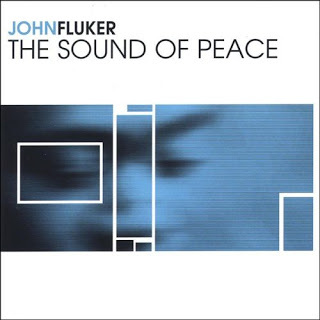 My three poems in March's issue of Verse-Virtual are gathered under the theme "Songs Without the Music." They come from my practice of scribbling possible lyrics while listening to favorite songs (then massaging them later).
My three poems in March's issue of Verse-Virtual are gathered under the theme "Songs Without the Music." They come from my practice of scribbling possible lyrics while listening to favorite songs (then massaging them later). I've also supplied links to YouTube performances of these songs, in case you'd like to try listening to the music while you read the poems. Or just listen to the (wordless) songs. Or just read the poems.
You can find the poems at http://www.verse-virtual.com/robert-knox-2019-march.html
Here's one of them.
Asleep Beneath the Moon*
How sweet is that?
Where else would you wish to sleep?
In the sun? You get burned.
Beneath the stars? Sure --
though lacking something, wouldn't you say, of the personal touch
given those astronomical distances?
But that big round face glowing with a mysterious and
perhaps even slightly creepy interest
in your petty human affairs here below? --
That could be nobody but the moon.
The moon has music.
It keeps coming, pouring,
flowing from the endless chain of mysterious
receding and persistent rebirths
(like a plant with thirteen annual springs)
defined by the astrophysical commands and
functional attentions --
explained in poems written many moons ago by Isaac Newton --
its darker moods always kept private
from our perverse, even morbid curiosity.
But look! Its enigmatic smile!
its off-center shadowy eye,
its intense ability to feature in pretty much
every mood and emotion
we call on it to express.
What is not lunar?
Its effect pure lunacy --
of attraction to distraction
(or the other way around)
but in its sweetest moments,
also, perhaps, the most summery,
another of its mysteries,
like first love --
It's the siren of sleep,
this marvel of a companionable moon --
we sing of in songs of love and loss
and, who knows,
perhaps even, in dreams, murmur its secret name
Where else would I choose to
burrow into unconsciousness, but
softly, safely, sensually,
(and quite often connubially)
beneath the moon?
*After the song by John Fluker; music at
https://www.youtube.com/watch?v=yK0lbDFAtfQ
You can find my poems and all the fine poems in the March issue at
http://www.verse-virtual.com/poems-and-articles.html
Published on February 28, 2019 10:01
February 27, 2019
The Garden of History: A Late Black History Month Salute for Black Soldiers in the American Revolution
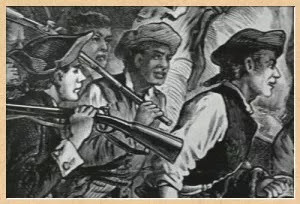 It's the last days of February, also known as Black History Month, and maybe if the month ran a few days longer, this contribution to the monthly theme wouldn't seem so last minute. But February, as Spike Lee pointed out at the Academy Awards presentation last Sunday, "is the shortest month of the year." And black filmmakers like himself seem regularly to be getting the short end of the stick. Nevertheless, the best picture controversy reminded me of a recent email I received from historian Harry Schenawolf, who writes articles and edits the "Revolutionary War Journal" website. A retired teacher and professor, historian and novelist, Schenawolf directed me to an article on the site titled "Black Presence in the American Revolutionary Army was Much Larger than What We've Thought or Been Told." His essay argues that the black contribution has been largely written off as an insignificant percentage of the total number of soldiers for fought American independence, approximately 300,000. Black participation has been estimated at 5,000, or about 1.6 percent.
It's the last days of February, also known as Black History Month, and maybe if the month ran a few days longer, this contribution to the monthly theme wouldn't seem so last minute. But February, as Spike Lee pointed out at the Academy Awards presentation last Sunday, "is the shortest month of the year." And black filmmakers like himself seem regularly to be getting the short end of the stick. Nevertheless, the best picture controversy reminded me of a recent email I received from historian Harry Schenawolf, who writes articles and edits the "Revolutionary War Journal" website. A retired teacher and professor, historian and novelist, Schenawolf directed me to an article on the site titled "Black Presence in the American Revolutionary Army was Much Larger than What We've Thought or Been Told." His essay argues that the black contribution has been largely written off as an insignificant percentage of the total number of soldiers for fought American independence, approximately 300,000. Black participation has been estimated at 5,000, or about 1.6 percent.[See http://www.revolutionarywarjournal.com/arm-negroes-to-the-principles-of-liberty-never-to-be-lost-in-a-contest-for-liberty-the-black-presence-in-the-american-revolutionary-army-was-much-larger-than-what-weve-tho/ ] But the true impact of black participation in the American War of Independence was considerably greater, Schenawolf contends, because of the differing life circumstances blacks and whites faced during that period. Many American soldiers enlisted for only 30 or 90 days. When their time was up they went home to take care of their families or harvest crops, or avoid spending horrendous winters with an army that lacked the resources to house, clothe and feed then properly in encampments such as the infamous Valley Forge.
But black enlistees stayed longer, many serving through the whole war, enduring winter camps and helping the Army to maintain a minimal strength because in many cases they had few or any other options. Some had no families or homes of their own to return to. Some, especially in Northern states, were African slaves who had been released from servitude for the express purpose of serving as fighters to prop up the cause of American independence. Citing the scholarly research of others, Schenawolf's article reports that contemporary observers placed the percentage of black soldiers at Valley Forge to 10 percent of the total number, even as the Army's size dropped to a mere 7,000. His article reproduces a full regiment by regiment accounting of the active duty rosters at Valley Forge during the winter to back up this estimate. As in almost areas of African American participation in American institutions, the story of black participation in the Revolutionary War is a varied tale. Opposed at the start by everyone from Washington to state governors and plantation owners, the practical demand for more soldiers to replace those who quit the fight when their enrollment was up, deserted, or were lost as casualties to battle or disease, found generals and governors searching for ways to produce new enrollments. "Shortly after General Washington took command of the army at Cambridge" in the war's first year, Schenawolf writes, "he issued orders to recruiting officers prohibiting the enlistment of any African Americans." But this ideological stance "was soon to erode by necessity and the fact that African American soldiers performed far beyond biased and preconceived prejudices." American leaders had initially banned and discouraged black participation in part because of fears their appearance in the uniforms of the War for Independence would weaken the institution of slavery, a source of great wealth to some of the movement's most important backers. When bodies are desperately needed, however, Schenawolf's research tells us, black bodies prove acceptable. Another reason to recruit blacks to the cause of independence was that the British were desperately seeking to fill their own ranks with deserting slaves. If you desert your rebel masters, British commander Henry Clinton urged the enslaved, you will find a home with us. In response, independence leaders encouraged Colonial slave owners to free their slaves for military service by offering enrollment bounties to their masters. This argument for this policy -- freedom in reward for service -- was expressed with characteristic eloquence (as quoted in Schenawolf's article) by Alexander Hamilton, who wrote that by “the dictates of humanity and true policy, slaves should be given their freedom with the swords to secure their fidelity, animate their courage, and influence those remaining in bondage by opening a door to their emancipation.” Emancipation for the cause of independence proved a tough sell in the deep South, but some Northern states embraced it. Rhode Island enrolled a full regiment of black soldiers who "proved themselves admirably in action, particularly during the Battles of Rhode Island and Yorktown," Schenawolf writes. "New Hampshire enlisted African Americans and gave to those who served three years the same bounty offered others." Constitution Framer James Madison highlighted the ideological connection between a war founded on a declaration of freedom and equality to the offer of liberation to enslaved Africans. Schenawolf states: James Madison succinctly suggested that the slaves be liberated and armed, “It would certainly be consonant to the principles of liberty,” he said, “which ought never to be lost sight of in a contest for liberty.” Black soldiers took part valiantly, sometimes heroically, in major battles. At the Battle of Bunker Hill, when British attackers survived a withering fire from American lines, the appearance of a saber-wielding British officer on top their redoubt demanding they surrender threw American soldiers into confusion. Had their position been overrun? Was resistance suddenly hopeless? Their indecision ended when African American soldier Peter Salem stepped forward and fired his musket into the chest of the British major, restoring the courage of the American defenders. While Georgia would not emancipate slaves to allow them to fight, the state did permit a slave named Austin Dabney to enlist as his master's substitute. He proved to be such a gallant fighter as an artilleryman that after a gunshot wound left him crippled for life, the state awarded him a pension. The all-black Rhode Island First Regiment saved American forces from a shattering defeat in the Battle of Rhode Island when they protected the rear of the American army retreating from the abandoned siege of British forces in Newport, according to witnesses. A Doctor Harris reported: "Had they been unfaithful or even given away before the enemy all would have been lost. Three times in succession they were attacked with more desperate valor and fury by well disciplined and veteran troops, and three times did they successfully repel the assault and thus preserved our army from capture.”[17] While Massachusetts, home to its share of African slaves, dithered on the question of forming a black regiment or inducing slaves to enlist, first-hand accounts noted the ”number of Negroes” in its regiments. British historian Bancroft wrote that "more than 700 black men fought side by side with the white.”[15]at the crucial battle of Monmouth, where Washington's army held its own against a superior British force.
The American use of black troops in its War of Independence also established a pattern for participation of African Americans in future country's wars. Schenawolf cites Benjamin Quarles’ study, The Negro in the American Revolution: "From colonial times until the twentieth century, the Negro would be bypassed in the early stages of conflict. But as the struggle grew arduous, civilian authorities and military commanders would turn to the one great remaining manpower pool, and the Negro would emerge from his status as a rejected inferior to become a comrade in arms.”
Recent research has given us more detailed information on the identities of black soldiers in the Revolutionary War. Research conducted by the Daughters of the American Revolution (as part of a settlement of a suit against the organization) was able to name some 5,000 black soldiers. In a story I wrote for the Boston Globe eight years ago, I reported that local historians in Plymouth County, Mass., after combing the DAR research, were able to identify 135 names from communities south of Boston. Bridgewater (a township that then encompassed what is now Brockton) had the highest total with 40. Twenty-six were from Plymouth, 10 from Middleborough, 10 from Scituate, 9 from Braintree, 8 from Hanover, and 5 each from Dedham and Stoughton. The sources I spoke to for this story also told me that they thought a proposal for a a national memorial for African-Americans who fought for American independence had merit. “I think it’s an excellent idea,” said Jermain Corbin, an African-American who taught African-American history in a Boston exam school. "Something that’s forgotten is that more than 5,000 black soldiers participated in the American Revolution." After reading Schenawolf's article and others on the American Revolution Journal website, I think there's may even be material here for a good movie. It's unlikely, however, to win the best picture Oscar.
Published on February 27, 2019 21:35
February 24, 2019
The Garden of Ideas: Where We Are, Why We’re Here, and How We Can Find the Way Back to Who We Should Be
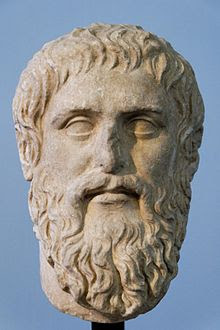 With almost two (potentially gruesome) years to go before the next Presidential election let’s take a look at who we are, and where we are, today. Who are we as a nation? How did we get here? How can we change?Answer to the first question: We’re a nation of TV watchers and phone-zombies who sheepishly conform to an outrageously unjust status quo. The super-rich own almost all the wealth, yet the other 99.9 percent of us appear content to scrap over the remaining slivers of the pie. Oh, and a particularly foul representative of the super-rich is current holding the highest office in the land. How did we get here? I’ll rephrase this number two question to a more specifically political question: How well is our Constitutional system of government working for us in the year 2019? Not very well, I submit, by any reasonable measure.Some people contend — I have read their reasoning in online comments — that the separation of powers provided by our Constitutional system has a better record for stability than parliamentary governments do. Defenders of the status quo point out that our system of government has never broken down into a Nazi-style totalitarian dictatorship that murders millions of people (including many of its own citizens) through legally authorized governmental procedures. I would submit that’s setting the bar pretty low. A more pertinent performance measure is that the United States of America is leading the pack (in tandem with China) toward the destruction of human life on earth through the rapid environmental degradation known as global warming, and closing its eyes to the coming climate apocalypse the rest of the world (even China) acknowledges is fast approaching. Meanwhile our government rushes to open up new public lands to fossil fuel exploitation in the mindless pursuit of more billions for those who already have more billions than they can count. When the sun is shining, Americans shrug off the threat of rapid climate change as if the superstorms weren’t coming quickly enough to turn Florida and Houston — as well as New York City and Boston — into mainland versions of storm-obliterated Puerto Rico. Some will object that our impotence in the face of global warming is the fault of the current fake-President we’re stuck with. While that claim is hardly the whole truth, it leads us directly to two or three other pressing questions. Why are we stuck with this Pretender? How did that happen? How do we know it will not happen again? Which is to say, in other words, after two years of misgovernance, why do we permit a dangerously unstable, fact-phobic, hate-mongering, lying sadist to go on ‘governing’ by media manipulation, while appointing ignorant, selfish, ass-hats like himself to major government jobs for the purposes of self-enrichment and furthering the corporate interests of mega-pigs already laughing themselves to the apocalypse? So, the answer, once again: The Constitutional system we’re so proud of isn’t working very well any more. The fake-President is not only unpopular with a solid majority of Americans, he distinctly lost the popular vote in the Presidential election that paradoxically put him on the throne. How do we prevent this “loser wins” scenario from happening again? The solution, in theory, is simple: choosing a President by national popular vote alone. Conventional wisdom tells us, however, that the only way to get to a national popular vote is to amend the Constitution. But that may not be the case. There is a quicker ‘work-around’ solution. An initiative known by the unwieldy name of The National Popular Vote Interstate Compact seeks to convince enough states to agree to commit all their electoral votes to the nationwide winner of the popular vote, regardless of who the winner in their state is. If states totaling a combined 270 electoral votes join the compact by passing a state law to this effect, then a presidential election would be determined by popular vote regardless of what the other states do. The compact’s backers contend that this agreement complies with the Constitution. That document’s Article II provides that “Each State shall appoint, in such Manner as the Legislature thereof may direct, a Number of Electors, equal to the whole Number of Senators and Representatives to which the State may be entitled in the Congress.” The key words here are: “in such Manner as the Legislature thereof may direct.” This approach seems to me to be a useful, though short-term solution. If its backers are successful, the multi-state agreement would make the popular vote winner the next US President. Now wouldn’t that be something? Imagine what the network TV screens would have to come up with if they could no longer meaningfully divide the national map into red and blue puzzle pieces, and eagerly count which way these arbitrarily constructed dominoes have fallen. It would no longer matter whether a few more voters in the state of Ohio favored candidate X or candidate Y. The only number that would matter was which way the national vote total was trending. Oh, the commentators would say in tones of hushed expectancy, here comes the vote from Texas! Let’s see if the Texas numbers puts Y over X, or keep X in the lead. Choosing Presidents by national popular vote brings other advantages as well. It would prevent candidates of the two major parties from concentrating almost all their efforts on a dozen or so “toss-up” states. Oh, boy, the operatives now way, rubbing their hand over our wasteful two-year run-up of endless complications to the Electoral Vote nonsense: New Hampshire is in play this year. And so is North Carolina. But in a victory by popular vote system, even if you’re certain to lose Alaska and the Dakotas you need to maintain a strong campaign presence there because every vote you win even in the states you lose counts to toward your popular vote total. Imagine that! Every vote would count! We have never had a presidential election in this country in which that statement could be made. Popular Vote elections would inevitably decrease inter-sectional divisiveness and hostility. White people from Mississippi and Vermont would no longer be forced to regard each other with suspicion. The dreaded “polarization” that begins and ends all current political discussion would immediately decrease as the experts discovered that many people in Louisiana have a lot in common with people from rural New York. And all their votes would count, even if the state plurality doesn’t swing their way. I consider The National Popular Vote Interstate Compact a ‘short-term solution’ because the artifice of the ‘electoral vote’ would still be on the books. It would be an end run around the current electoral vote system, instead of its complete abolition — the goal greatly to be desired if you are a believer in democracy.Remember, the ‘will of the people’ is the basis of ‘democracy.’ ‘One person, one vote.’ ‘The majority has spoken.’ And every citizen has the right to vote. Secondly, as a mathematical device, a work-around to nullify the destructive flaws in the current anachronistic Presidential selection method, the cure is vulnerable to attack. What if one or more states pulls out of the compact, putting its committed electoral vote total below 270? Then we’re back to the same undemocratic system we have today. A work-around, rather than abolition, still implies the legitimacy of the Great Compromise monkey business in the Constitution that gave the right to choose the President to “electors” rather than to the people to protect the supposed ‘rights’ and interests of small states. Sorry, when it comes to the sacred democratic right of the ballot box, states have no legitimate rights. Only citizens, human beings, have the right to vote. Let us clearly recognize and protect that right. Vermont has the second smallest population, and has voted strongly blue. Yet many of its voters routinely choose Republican candidates. So in that state, and all 49 others, the results exhibit two (at least) different views of where the state’s best interests lie. To speak of Vermont’s, or Kentucky’s, or New York State’s “interests” is to invent an abstraction that does not exist. In what ways are New Yorkers’ interests different from those living any other states? There is no “New York vote.” Whatever candidate a plurality of the state’s voters may choose, New Yorkers do not think alike. In their personal and material interests, they are all over the map. They are socialists and libertarians, to some greater or lesser degree; as they are liberals and conservatives. They are professionals, artisans, blue collar workers, white collar workers, service workers, as well as bankers, brokers, and attorneys. If for example voters in New York vote their interests as poorly paid service workers, they are voting just as millions of citizens in Louisiana and Florida (and the rest of the country) are. This is true of people in every state in every region in the country. Citizens in every state in the country do not all think or vote alike. But however they vote, our election system should let that vote be recognized and honored. If only two people in some Mississippi hamlet wish to vote Blue, let them do it and let those votes count. If only two crusty old-timers in a Vermont village near a wacko-liberal college wish to vote Red, let their votes count as well. The Constitution’s state-based ‘only-Electors-truly-vote’ system not only violates the right of the majority to choose, it violates the right of the minority to speak through their vote. That right is implicit in any democratic government. But that right is meaningless if those votes have no weight in the final nationwide decision. Understand, please, that the Constitutional Framers did not ‘fail’ to create a democratic system for choosing a President. They did not wish to. They intentionally created a system in which a privileged minority had the sole right to choose a President. Constitutional amendments long ago gave to increasing numbers of citizens the right to choose their state’s electors. But Presidential elections are still far from democratic, so long as the system is still dogged by the unequal and unfair distribution of electoral votes, favoring the less populous states over the states in which the majority of Americans live and vote. This is the subject discussed in my ‘story’ posted here back in November: https://medium.com/@rcknox2/another-election-another-split-decision-how-constitutional-roadblocks-to-democracy-continue-to-331d8a6b3d40 I’m tempted to make that whole argument over again here, but will forbear. (Short take: since the Constitution gives each state regardless of population 2 electoral votes representing its 2 US Senators, the impact of less populous states is increased; the impact of more populous is decreased. It’s just math. But it helps explain why candidates can win the electoral vote while losing the popular vote. Also, the reliance on state-by-state pluralities, instead of a national plurality, and the rule that entitles state winners to all their state’s electoral votes allow the winner in a handful of closely contested states to gather more electoral votes than the candidate who wins other states by large majorities. Put all these undemocratic twists and tweaks into one election system, and what do you get? Answer: Trump.) On to our next major question: How hard can it be to change the voting system and simply count every vote? In fact it is very difficult because we can change the Constitution only by absurdly difficult, drawn-out, undemocratic and complicated methods that simply don’t work any more. Which is why the National Popular Vote Interstate Compact — as discussed above — has drawn wide interest, and actual support from 11 states, plus the District of Columbia, totaling 172 votes. The Constitutional Amendment process is yet another anachronistic feature of our system of government. In an effort to create a high bar to structural change, lest people make too many sensible, modernizing changes, the Framers required that any proposal to amend the Constitution receive the approval of three-quarters of the states. Once again, giving an important power to the ‘semi-sovereign’ fictions we call ‘states’ allows a small minority to thwart the will of the majority. The rejection of a proposed amendment — let us say, for example, the Equal Rights Amendment — by a mere 13 states dooms the whole idea. Since (once again, do the math) the populations of our states are wildly unequal, 13 states with a total of less than 10 percent of the country’s population can block a change sought by 90 percent of the country. No amendment has been ratified since 1967, when the 25th amendment addressing the issue of Presidential succession — following the Kennedy assassination (in 1963) — was ratified. As it happens, the 25th Amendment contains a provision that many voices consider relevant to our current crisis, because it provides a method (known as Section 4) to remove a President who is too physically or mentally impaired to continue his duties. Many people have called for this section to be applied toward the removal from office of the current fake-President on the grounds of psychiatric impairment given his evident inability to distinguish empirical truth from his own wishes and delusions, and his inability to restrain himself from compulsive lying for perceived advantage and the persistent repetition of clearly, publicly exposed falsehoods. Whether he knowingly lies, and thinks he can get away with it (since his ‘base’ is as easily deluded as he is) or is unable to accept that known facts repudiate his prejudiced views, the resulting disconnect from reality in someone wielding the powers of the Presidency appears to most of us to present a serious peril to the people in this country and the entire world. In fact, anyone who does not recognize this danger is playing dice with the universe. So why can’t this constitutional provision be brought to bear? The answer is simple. Partisan politics. Section 4 requires the vice-president and a majority of the principal officers of the executive departments — i.e. the cabinet — to initiate the process. The VP and cabinet heads appointed by our fake-dunderhead and approved by a Republican Senate are all Republicans themselves, and most of them have proved to be toadies and ignoramuses like the Pretender himself. It is simply not possible to get rid of a bad POTUS on mental health grounds unless all parties behave responsibly and put the interests of the country ahead of the interests of their party and themselves. Fat chance in 2019. The only other legal method to remove a President is impeachment. Since most all of us know how that works and — like the members of the House of Representatives — are waiting for the Mueller report to jump-start the process, let’s put this matter aside, and move on to my final major question. How do we prevent this predicament — a dangerously bad President installed by a disastrously outmoded system — from recurring? My answer is evident: Abolish the electoral vote in favor of the national popular vote as the sensible, democratic way to elect a President. But, given the previously discussed problem of the unworkable Constitutional Amendment system, how do we make this change? My answer is a radical one: a national plebiscite. Which, of course, is a kind of national popular vote in itself. Let’s have Congress pass a law creating a nationwide up-or-down vote on changing how the winner of our Presidential election is determined from the artificial and undemocratic electoral vote count to a simple plurality in the nationwide vote But, of course, you will say and I will agree, it’s impossible to get the current Congress to agree on anything both fundamental and consequential, because our divided form of government means that a Republican Senate will never go along with a proposal to change a system that has given their party an advantage in recent elections. So, I reply, still more radically, we the people should hold this national plebiscite and do so in the name of the American people. After all it was “we the people” who gave birth to the American nation. It says so in our founding document. So, logically, we the people have the right to change it. Let’s create an ad hoc non-partisan, widely representative Good Government Commission to publicize, organize, arrange, hold, manage, count the votes and otherwise authorize a national plebiscite on this necessary, fundamental change in how we choose a President. If local government authorities don’t wish to cooperate with this grass-roots initiative, we’ll do it all ourselves. We’ll collect votes at supermarkets. Outside post offices. In schools and veterans clubs, and gyms, in libraries and the YMCA. It’s not impossible to bypass our government. Our political parties do it all the time. They already have the voting lists. Put everything online — all the information on when and where to vote; even the voting lists themselves. Make sure that every registered voter will be told — by mail, email, personal phone call, howsoever — here’s how and where you vote. Yes, there will be a thousand details to iron out. That’s why we need a grass-roots, popular, national citizen-led movement to create our Good Government Commission. What I’m talking about amounts to a popular, non-violent, citizen-initiated ‘revolution.’ Once this revolution succeeds, government — our existing institutions — will join us. Congress, the courts, local town clerk offices will not wish to be left out. They are nothing without us. They exist to serve the people. If they stop doing that, they’re not needed. Political parties, alongside governmental bodies, will freely accept the new national popular vote election system. If they don’t, new political organizations will quickly replace them. And with the precedent of the national plebiscite established, we will also have a tool to address that other lingering, insoluble problem: how to rid the country of a President who is no longer able to perform his duties because of mental (or some other) impairment, endangering the security of both the nation and the world. You guessed it: We hold a nationwide vote on whether to remove a sitting President whose impairment, or erratic conduct, poses a threat to the nation. No elections are perfect, and no electoral system can promise to deliver the ‘right’ choice every time. Popular vote totals even in fairly recent elections would have given us the same bad choices that the Electoral College gave us: Nixon over Humphrey; Reagan over Carter. Those of us who believe in democracy — and argue for more democracy in our system of government — know this is so. But in a nation of tens of millions of registered voters, counting every vote is certain to offer a clear winner. If, for example, ‘we the people’ are given the opportunity to choose by popular vote whether or not to remove the current threat to the existence of life on earth currently barfing all over ‘our democratic system,’ I’ll be satisfied. Maybe the American people will vote to keep him. That’s all right too. Just shoot me.
With almost two (potentially gruesome) years to go before the next Presidential election let’s take a look at who we are, and where we are, today. Who are we as a nation? How did we get here? How can we change?Answer to the first question: We’re a nation of TV watchers and phone-zombies who sheepishly conform to an outrageously unjust status quo. The super-rich own almost all the wealth, yet the other 99.9 percent of us appear content to scrap over the remaining slivers of the pie. Oh, and a particularly foul representative of the super-rich is current holding the highest office in the land. How did we get here? I’ll rephrase this number two question to a more specifically political question: How well is our Constitutional system of government working for us in the year 2019? Not very well, I submit, by any reasonable measure.Some people contend — I have read their reasoning in online comments — that the separation of powers provided by our Constitutional system has a better record for stability than parliamentary governments do. Defenders of the status quo point out that our system of government has never broken down into a Nazi-style totalitarian dictatorship that murders millions of people (including many of its own citizens) through legally authorized governmental procedures. I would submit that’s setting the bar pretty low. A more pertinent performance measure is that the United States of America is leading the pack (in tandem with China) toward the destruction of human life on earth through the rapid environmental degradation known as global warming, and closing its eyes to the coming climate apocalypse the rest of the world (even China) acknowledges is fast approaching. Meanwhile our government rushes to open up new public lands to fossil fuel exploitation in the mindless pursuit of more billions for those who already have more billions than they can count. When the sun is shining, Americans shrug off the threat of rapid climate change as if the superstorms weren’t coming quickly enough to turn Florida and Houston — as well as New York City and Boston — into mainland versions of storm-obliterated Puerto Rico. Some will object that our impotence in the face of global warming is the fault of the current fake-President we’re stuck with. While that claim is hardly the whole truth, it leads us directly to two or three other pressing questions. Why are we stuck with this Pretender? How did that happen? How do we know it will not happen again? Which is to say, in other words, after two years of misgovernance, why do we permit a dangerously unstable, fact-phobic, hate-mongering, lying sadist to go on ‘governing’ by media manipulation, while appointing ignorant, selfish, ass-hats like himself to major government jobs for the purposes of self-enrichment and furthering the corporate interests of mega-pigs already laughing themselves to the apocalypse? So, the answer, once again: The Constitutional system we’re so proud of isn’t working very well any more. The fake-President is not only unpopular with a solid majority of Americans, he distinctly lost the popular vote in the Presidential election that paradoxically put him on the throne. How do we prevent this “loser wins” scenario from happening again? The solution, in theory, is simple: choosing a President by national popular vote alone. Conventional wisdom tells us, however, that the only way to get to a national popular vote is to amend the Constitution. But that may not be the case. There is a quicker ‘work-around’ solution. An initiative known by the unwieldy name of The National Popular Vote Interstate Compact seeks to convince enough states to agree to commit all their electoral votes to the nationwide winner of the popular vote, regardless of who the winner in their state is. If states totaling a combined 270 electoral votes join the compact by passing a state law to this effect, then a presidential election would be determined by popular vote regardless of what the other states do. The compact’s backers contend that this agreement complies with the Constitution. That document’s Article II provides that “Each State shall appoint, in such Manner as the Legislature thereof may direct, a Number of Electors, equal to the whole Number of Senators and Representatives to which the State may be entitled in the Congress.” The key words here are: “in such Manner as the Legislature thereof may direct.” This approach seems to me to be a useful, though short-term solution. If its backers are successful, the multi-state agreement would make the popular vote winner the next US President. Now wouldn’t that be something? Imagine what the network TV screens would have to come up with if they could no longer meaningfully divide the national map into red and blue puzzle pieces, and eagerly count which way these arbitrarily constructed dominoes have fallen. It would no longer matter whether a few more voters in the state of Ohio favored candidate X or candidate Y. The only number that would matter was which way the national vote total was trending. Oh, the commentators would say in tones of hushed expectancy, here comes the vote from Texas! Let’s see if the Texas numbers puts Y over X, or keep X in the lead. Choosing Presidents by national popular vote brings other advantages as well. It would prevent candidates of the two major parties from concentrating almost all their efforts on a dozen or so “toss-up” states. Oh, boy, the operatives now way, rubbing their hand over our wasteful two-year run-up of endless complications to the Electoral Vote nonsense: New Hampshire is in play this year. And so is North Carolina. But in a victory by popular vote system, even if you’re certain to lose Alaska and the Dakotas you need to maintain a strong campaign presence there because every vote you win even in the states you lose counts to toward your popular vote total. Imagine that! Every vote would count! We have never had a presidential election in this country in which that statement could be made. Popular Vote elections would inevitably decrease inter-sectional divisiveness and hostility. White people from Mississippi and Vermont would no longer be forced to regard each other with suspicion. The dreaded “polarization” that begins and ends all current political discussion would immediately decrease as the experts discovered that many people in Louisiana have a lot in common with people from rural New York. And all their votes would count, even if the state plurality doesn’t swing their way. I consider The National Popular Vote Interstate Compact a ‘short-term solution’ because the artifice of the ‘electoral vote’ would still be on the books. It would be an end run around the current electoral vote system, instead of its complete abolition — the goal greatly to be desired if you are a believer in democracy.Remember, the ‘will of the people’ is the basis of ‘democracy.’ ‘One person, one vote.’ ‘The majority has spoken.’ And every citizen has the right to vote. Secondly, as a mathematical device, a work-around to nullify the destructive flaws in the current anachronistic Presidential selection method, the cure is vulnerable to attack. What if one or more states pulls out of the compact, putting its committed electoral vote total below 270? Then we’re back to the same undemocratic system we have today. A work-around, rather than abolition, still implies the legitimacy of the Great Compromise monkey business in the Constitution that gave the right to choose the President to “electors” rather than to the people to protect the supposed ‘rights’ and interests of small states. Sorry, when it comes to the sacred democratic right of the ballot box, states have no legitimate rights. Only citizens, human beings, have the right to vote. Let us clearly recognize and protect that right. Vermont has the second smallest population, and has voted strongly blue. Yet many of its voters routinely choose Republican candidates. So in that state, and all 49 others, the results exhibit two (at least) different views of where the state’s best interests lie. To speak of Vermont’s, or Kentucky’s, or New York State’s “interests” is to invent an abstraction that does not exist. In what ways are New Yorkers’ interests different from those living any other states? There is no “New York vote.” Whatever candidate a plurality of the state’s voters may choose, New Yorkers do not think alike. In their personal and material interests, they are all over the map. They are socialists and libertarians, to some greater or lesser degree; as they are liberals and conservatives. They are professionals, artisans, blue collar workers, white collar workers, service workers, as well as bankers, brokers, and attorneys. If for example voters in New York vote their interests as poorly paid service workers, they are voting just as millions of citizens in Louisiana and Florida (and the rest of the country) are. This is true of people in every state in every region in the country. Citizens in every state in the country do not all think or vote alike. But however they vote, our election system should let that vote be recognized and honored. If only two people in some Mississippi hamlet wish to vote Blue, let them do it and let those votes count. If only two crusty old-timers in a Vermont village near a wacko-liberal college wish to vote Red, let their votes count as well. The Constitution’s state-based ‘only-Electors-truly-vote’ system not only violates the right of the majority to choose, it violates the right of the minority to speak through their vote. That right is implicit in any democratic government. But that right is meaningless if those votes have no weight in the final nationwide decision. Understand, please, that the Constitutional Framers did not ‘fail’ to create a democratic system for choosing a President. They did not wish to. They intentionally created a system in which a privileged minority had the sole right to choose a President. Constitutional amendments long ago gave to increasing numbers of citizens the right to choose their state’s electors. But Presidential elections are still far from democratic, so long as the system is still dogged by the unequal and unfair distribution of electoral votes, favoring the less populous states over the states in which the majority of Americans live and vote. This is the subject discussed in my ‘story’ posted here back in November: https://medium.com/@rcknox2/another-election-another-split-decision-how-constitutional-roadblocks-to-democracy-continue-to-331d8a6b3d40 I’m tempted to make that whole argument over again here, but will forbear. (Short take: since the Constitution gives each state regardless of population 2 electoral votes representing its 2 US Senators, the impact of less populous states is increased; the impact of more populous is decreased. It’s just math. But it helps explain why candidates can win the electoral vote while losing the popular vote. Also, the reliance on state-by-state pluralities, instead of a national plurality, and the rule that entitles state winners to all their state’s electoral votes allow the winner in a handful of closely contested states to gather more electoral votes than the candidate who wins other states by large majorities. Put all these undemocratic twists and tweaks into one election system, and what do you get? Answer: Trump.) On to our next major question: How hard can it be to change the voting system and simply count every vote? In fact it is very difficult because we can change the Constitution only by absurdly difficult, drawn-out, undemocratic and complicated methods that simply don’t work any more. Which is why the National Popular Vote Interstate Compact — as discussed above — has drawn wide interest, and actual support from 11 states, plus the District of Columbia, totaling 172 votes. The Constitutional Amendment process is yet another anachronistic feature of our system of government. In an effort to create a high bar to structural change, lest people make too many sensible, modernizing changes, the Framers required that any proposal to amend the Constitution receive the approval of three-quarters of the states. Once again, giving an important power to the ‘semi-sovereign’ fictions we call ‘states’ allows a small minority to thwart the will of the majority. The rejection of a proposed amendment — let us say, for example, the Equal Rights Amendment — by a mere 13 states dooms the whole idea. Since (once again, do the math) the populations of our states are wildly unequal, 13 states with a total of less than 10 percent of the country’s population can block a change sought by 90 percent of the country. No amendment has been ratified since 1967, when the 25th amendment addressing the issue of Presidential succession — following the Kennedy assassination (in 1963) — was ratified. As it happens, the 25th Amendment contains a provision that many voices consider relevant to our current crisis, because it provides a method (known as Section 4) to remove a President who is too physically or mentally impaired to continue his duties. Many people have called for this section to be applied toward the removal from office of the current fake-President on the grounds of psychiatric impairment given his evident inability to distinguish empirical truth from his own wishes and delusions, and his inability to restrain himself from compulsive lying for perceived advantage and the persistent repetition of clearly, publicly exposed falsehoods. Whether he knowingly lies, and thinks he can get away with it (since his ‘base’ is as easily deluded as he is) or is unable to accept that known facts repudiate his prejudiced views, the resulting disconnect from reality in someone wielding the powers of the Presidency appears to most of us to present a serious peril to the people in this country and the entire world. In fact, anyone who does not recognize this danger is playing dice with the universe. So why can’t this constitutional provision be brought to bear? The answer is simple. Partisan politics. Section 4 requires the vice-president and a majority of the principal officers of the executive departments — i.e. the cabinet — to initiate the process. The VP and cabinet heads appointed by our fake-dunderhead and approved by a Republican Senate are all Republicans themselves, and most of them have proved to be toadies and ignoramuses like the Pretender himself. It is simply not possible to get rid of a bad POTUS on mental health grounds unless all parties behave responsibly and put the interests of the country ahead of the interests of their party and themselves. Fat chance in 2019. The only other legal method to remove a President is impeachment. Since most all of us know how that works and — like the members of the House of Representatives — are waiting for the Mueller report to jump-start the process, let’s put this matter aside, and move on to my final major question. How do we prevent this predicament — a dangerously bad President installed by a disastrously outmoded system — from recurring? My answer is evident: Abolish the electoral vote in favor of the national popular vote as the sensible, democratic way to elect a President. But, given the previously discussed problem of the unworkable Constitutional Amendment system, how do we make this change? My answer is a radical one: a national plebiscite. Which, of course, is a kind of national popular vote in itself. Let’s have Congress pass a law creating a nationwide up-or-down vote on changing how the winner of our Presidential election is determined from the artificial and undemocratic electoral vote count to a simple plurality in the nationwide vote But, of course, you will say and I will agree, it’s impossible to get the current Congress to agree on anything both fundamental and consequential, because our divided form of government means that a Republican Senate will never go along with a proposal to change a system that has given their party an advantage in recent elections. So, I reply, still more radically, we the people should hold this national plebiscite and do so in the name of the American people. After all it was “we the people” who gave birth to the American nation. It says so in our founding document. So, logically, we the people have the right to change it. Let’s create an ad hoc non-partisan, widely representative Good Government Commission to publicize, organize, arrange, hold, manage, count the votes and otherwise authorize a national plebiscite on this necessary, fundamental change in how we choose a President. If local government authorities don’t wish to cooperate with this grass-roots initiative, we’ll do it all ourselves. We’ll collect votes at supermarkets. Outside post offices. In schools and veterans clubs, and gyms, in libraries and the YMCA. It’s not impossible to bypass our government. Our political parties do it all the time. They already have the voting lists. Put everything online — all the information on when and where to vote; even the voting lists themselves. Make sure that every registered voter will be told — by mail, email, personal phone call, howsoever — here’s how and where you vote. Yes, there will be a thousand details to iron out. That’s why we need a grass-roots, popular, national citizen-led movement to create our Good Government Commission. What I’m talking about amounts to a popular, non-violent, citizen-initiated ‘revolution.’ Once this revolution succeeds, government — our existing institutions — will join us. Congress, the courts, local town clerk offices will not wish to be left out. They are nothing without us. They exist to serve the people. If they stop doing that, they’re not needed. Political parties, alongside governmental bodies, will freely accept the new national popular vote election system. If they don’t, new political organizations will quickly replace them. And with the precedent of the national plebiscite established, we will also have a tool to address that other lingering, insoluble problem: how to rid the country of a President who is no longer able to perform his duties because of mental (or some other) impairment, endangering the security of both the nation and the world. You guessed it: We hold a nationwide vote on whether to remove a sitting President whose impairment, or erratic conduct, poses a threat to the nation. No elections are perfect, and no electoral system can promise to deliver the ‘right’ choice every time. Popular vote totals even in fairly recent elections would have given us the same bad choices that the Electoral College gave us: Nixon over Humphrey; Reagan over Carter. Those of us who believe in democracy — and argue for more democracy in our system of government — know this is so. But in a nation of tens of millions of registered voters, counting every vote is certain to offer a clear winner. If, for example, ‘we the people’ are given the opportunity to choose by popular vote whether or not to remove the current threat to the existence of life on earth currently barfing all over ‘our democratic system,’ I’ll be satisfied. Maybe the American people will vote to keep him. That’s all right too. Just shoot me.
Published on February 24, 2019 10:39
February 23, 2019
The Garden of Verse: A Warm Poetic Harvest in a Chilly Winter Month
 Weather's fine. Weather's foul. It's winter time in the city -- and the country, and the suburbs, and everywhere else. Though, I'm told, the temps are pleasantly warm in Sri Lanka, as they are in Cancun on the Mexican coast. Thankfully up here in the north, we have poetry to keep us warm. Here are my thoughts on some of the many fine poems I admired in the February issue of Verse-Virtual. http://www.verse-virtual.com/poems-and-articles.html
Weather's fine. Weather's foul. It's winter time in the city -- and the country, and the suburbs, and everywhere else. Though, I'm told, the temps are pleasantly warm in Sri Lanka, as they are in Cancun on the Mexican coast. Thankfully up here in the north, we have poetry to keep us warm. Here are my thoughts on some of the many fine poems I admired in the February issue of Verse-Virtual. http://www.verse-virtual.com/poems-and-articles.html Judy Kronenfeld's poem "Ex-New Yorker Remembers Her Natural Landscape" is a pleasure trip from its perfect title onward -- the 'natural landscape' of the urban childhood lives on in the heart and senses. I love the epithets that introduce successive stanzas on the city's various characteristics: Fortress City, Tree-house city, Infinite city, Intimate city, Vertiginous city. And the rich imagery that follows from the title metaphor, in lines such as lines:
"and far below, five o’clock tides
of dusky forests surge forward,
each tree moated by its inner
silence"
A truly evocative poem.
Robert Wexelblatt's "Mrs. Podolski’s Critique of Judgment" is a superb rendering of a worldly woman's skeptical view of the deeds of men and women, particularly of men in this poem. The poem suggests that human beings make up, and remake, our notions of right and wrong as we go along through the life, so that the ethical may in fact be situational. So many pleasingly voiced concrete particulars illustrate the unfolding argument, starting right from the top:
"Certainty’s the clothesline on which we pin
the wash of our unmentionable doubt;
the dubious laundry we take in to make
believe we’re sure of what we’re sure about."
Dewitt Clinton's poem titled, in part, "is it Possible to Write an After After?," asks that question following the mention of poems by David Graham and Robert Bly (good company, for sure). For me, the poem raises the probably unanswerable question of the relationship between time and permanence, a question poets (Shakespeare comes to mind) and philosophers have long asked. I take the poem's answer from these memorable lines. "... oh, and who
Can ever remember the time we crossed
The cold Atlantic and dined under new
Stars, and then I take a picture of you,
looking so longingly to Lady Liberty.
Don’t you remember that? And then,
Soon, we can’t even see land as we’re
So far away, we can’t see anything but
Waves, waves, way too many waves."
Yes, I think, we do remember. Despite the waves.
Barbara Crooker's wise and finely observed ekphrastic poem "Books," begins with "a world where books were scarce. Where copying was done by human hand" and describes the image of a saint holding such a book. But then the poem steps away and turns its attention to what philosophers call 'the sensuous immediate' of a blackbird's song: "its clear six notes the only sound.
They pierce me like nails. He might be saying
Listen, listen, listen."
This is not a poem about what poetry is, but what poets do. The bird's call is a reminder:
"my job is to pay attention."
Of the three vivid, wintry poems from Steve Klepetar, I particularly enjoyed "Acting Normal," a poem that attributes an uncanny importance to the nonhuman actors in the world drama of which we're a part -- but only a part. And we don't necessarily know where the play is going.
Blue jays (the poem tells us) "are everywhere." More disturbing, perhaps is the information "that here
in Berkshire county there are thousands
of bears, that any time you’re in the woods,
you’re not too far from one." This piece of information leads to the superbly ominous (yet also somehow humorous) final two sentences. Rather than offering a spoiler quote here, I urge everyone to read the poem.
Another pleasingly wintry poem -- and urban poem -- is Robert Johnson's "FEBRUARY IN THE CITY," evoking
"a day so harsh and beautiful" and delivering a strong and paradoxical conclusion. Again, please read it for yourself.
In J.R. Sonche's poem "TWO PORTRAITS BY MATHEW BRADY" the visual subject is a famous photographer's take on two famous poets. The poem points out, in detail, how thoroughly the portrait of Walt Whitman captures the relaxed, natural, open-hearted everyman -- certainly one side of the poet's self-image. But gender, this poem shrewdly notices, is a tricky matter for the all-encompassing Whitman.
"He looks like a grandfather, Walt does.Better than that, Walt looks like a grandmother,even with the beard, a grandmother, kindly and wise."
As the poem points out, Brady's portrait of Nathaniel Hawthorne gives a very different impression.
Kate Sontag's "Recognition Scene" is another poem with a shrewd title. A dramatic high point in classical literature, the recognition scene for the donor of the "bulky blue coat" in this poem comes in the supermarket:
"You want to apologize to its wearer, pushing
her grocery cart past the dairy section,
for the tiny hole in the left pocket revealing a wintery
tuft of polyester fill, the linty purple socks you threw
last minute into the duffle along with wrinkled flannel
shirts and a pilled bathrobe long overdue for Goodwill."
The poem mines the rich detail and consequent reflection caused by this encounter, in which the self discovers in the stranger wearing her coat a 'secret' double. Again, the last lines in this well wrought poem repay a reading.
A lot of nourishment in February's issue for a winter month whose best feature is its brevity.

Published on February 23, 2019 10:05
February 19, 2019
Sonya Meyerson-Knox of Jewish Voice For Peace on "Weaponizing Antisemitism" the smear campaign against Ilhan Omar
Published on February 19, 2019 07:46
February 15, 2019
The Garden of Prose: My Second Novel Wins a Prize and Finds a Publisher!
 My novel "Karpa Talesman" has won a competition and found a publisher in Hidden River Arts, a regional arts organization based in Philadelphia. The organization chose my book as a winner in one of its literary competitions. Here's the announcement in the March-April issue of Poets &Writers Magazine:
My novel "Karpa Talesman" has won a competition and found a publisher in Hidden River Arts, a regional arts organization based in Philadelphia. The organization chose my book as a winner in one of its literary competitions. Here's the announcement in the March-April issue of Poets &Writers Magazine: Hidden River Arts
Prophecy Creek Book Award in Speculative Fiction
Robert Knox of Quincy, Massachusetts, won the 2018 Prophecy Creek Book Award in Speculative Fiction for "Karpa Talesman." He received $1,000, and his book will be published by Hidden River Publishing. The editors judged. The annual award is given for a book-length work of speculative fiction.
Hidden River Arts, P.O. Box 63927, Philadelphia, PA 19147. (610) 764-0813. Debra Leigh Scott, Founding Director.
hiddenriverarts@gmail.com
hiddenriverarts.com
Poets & Writers Magazine is the 'industry journal' for creative writers. I've been hoping to see my name in its pages for years.
Hidden River Arts has over the past half year announced
winners in a range of literary genres.
Speculative fiction is a publishing category encompassing literary fiction that employs elements of science fiction or fantasy, or simply imagines events in a world that resembles -- but is clearly not -- our own.
I don't have a publication date yet for the new book, and publication is sometimes a lengthy process. I'll share it when I do (no surprise there). But I couldn't wait to share the news of the announcement.
Here's a brief summary of the premise of "Karpa Talesman," a story that takes place partly in a world much like good old earth, and mostly in the imagined sister-world of urth, which resembles our planet at earlier stages of the development of civilization:
At a time when Planet Earth appears to be running out of time itself -- hours disappear and trees aren't where you found them yesterday -- the scientists of the Dream Project are looking to send the right somebody to another world. They're hoping that an off-world point of view might give them a perspective on the problem. Entomologist Sheena Drey, whose own work has been rendered meaningless by the disturbing changes in her planet's eccentric timeline behavior, discovers that the last gasp planet-saving project is setting up a lab in her building in the MIT neighborhood of Cambridge. She then learns that her husband Copper, a part-time college teacher and 'dreamer,' has volunteered for the project and is lying in an induced coma-like state in the project's lab. The project's drugs have transported the dreaming Copper to a different existence in a different world, where he struggles to cope with an alien way of life and the radical solitude caused by the lingering intimation that he is living the wrong life in the wrong place. On 'urth,' a planet at a technically lower stage of development, Copper becomes Karpa Talesman, eventually turning his experiences with brutal slavers, back magic, rival dukes, assassins sent from his own world, a powerful shaman, Homeric bards and sophists-for-hire into the stories he shares with the co-inhabitants of his multiverse 'dream.' But have the 'wizeguys' or gods of this world planted in his mind the clue that will help save his own planet?...
After that, pretty much everything I can think of to happen, happens. I can't wait until I can share the whole thing.
Published on February 15, 2019 11:09
February 10, 2019
The Garden of History: Emerson and Thoreau, Michelle Obama and Higher Law, and How to Get Rid of the Great Pretender
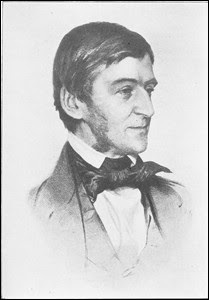 Ralph Waldo EmersonHenry David Thoreau
Ralph Waldo EmersonHenry David Thoreau
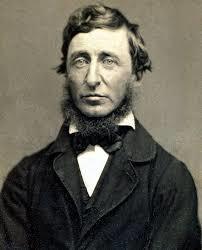 When civil law doesn't work, and enormously disastrous consequences are in the offing, it's time to turn to higher law. "When they go low, we go high" -- or so Michelle Obama famously said. It's a great credo -- or, as we say today, 'sound bite' -- but so far we haven't done it. Not really. They go low, and we just shake a
When civil law doesn't work, and enormously disastrous consequences are in the offing, it's time to turn to higher law. "When they go low, we go high" -- or so Michelle Obama famously said. It's a great credo -- or, as we say today, 'sound bite' -- but so far we haven't done it. Not really. They go low, and we just shake a
 finger and say "naughty, naughty."
finger and say "naughty, naughty." What do we mean by going 'high'? How about "higher law"? The phrase, and the concept behind it, has an age-old weight and credibility in the history of American political thought. In particular, it was responsible for organizing and motivating the radical Abolitionist movement in 19th century America that led ultimately to the end of slavery. The abolition of slavery in America is generally regarded as a positive step unless, of course, you were raised white in Virginia, and quite likely in any of the other states of the Old Confederacy, as recent events suggest. I'm not quite sure why these states were permitted to rejoin the USA with full rights and status. I think their membership in the union should have been conditional on good behavior. Considering what's gone on in many of these places since 1865, I believe they would probably still be on probation today. But let's "go high" -- as the former First Lady suggests -- and look at the historical circumstances surrounding the emergence of the theory of "higher law." African slavery was the great Constitutional crisis between the era War of Independence and the founding of the United States and the era of the industrial crises and wars of the 20th century. The USA survived it only by an enormous national cost in spilled blood and good luck. In the hands of any 19th century President other than Abraham Lincoln, the country would not have survived it intact. In that time of crisis America's leading thinkers made appeal to the concept of "higher law" to justify that opposition to slavery that included evading, ignoring and systematic disobedience to national law. Faced with The Fugitive Slave Act (an essential piece of the sectional Great Compromise of 1850) America's first original intellectual and cultural figures embraced the notion of a moral law that transcended civil laws. Ralph Waldo Emerson, still the most influential thinker produced by American culture (Thomas Jefferson and other members of the 'founding generation' were products of the flowering of European thought know as the Enlightenment), contended that Americans, like members of the civilizations that came before, had a right to "an original relationship with the universe... There are new lands, new men, new thoughts. Let us demand our own works and laws and worship." See http://transcendentalism-legacy.tamu.... As slavery became the wedge issue of the mid-19th century sectional crisis, and Abolition the moral crusade of his own home state of Massachusetts, Emerson was forced to consider whether citizens were obliged to follow the dictates of civil law when the morally repulsive Fugitive Slave Act became the law of the land. The law gave white people in any state of the union the right to imprison any black person they suspected of having once been a slave -- and either return them to their owner and make their own claim of ownership. Courts were empowered to ratify the claim, with blacks given only minimal opportunities to prove that they were free 'persons.' Slave catchers, or mere criminals, moved north in droves to hunt for African Americans. In Massachusetts white Americans rallied against the law, mobbing slave catches and freeing their captives by force. Abolitionists such as Henry David Thoreau hid fugitives in their own homes and helped them reach the next safe house in an underground passageway to Canada, now the only place where they could be safe. Once the most famous politician of his day, Massachusetts Senator Daniel Webster was driven from office for his support of the Great Compromise, and replaced by the abolitionist Charles Sumner. The Fugitive Slave Law caused Emerson to formulate a justification for disobeying civil law by appealing to what he called "higher law" -- a universal moral law in tune with 'nature' rather than temporal politics -- with the right to nullify civil laws that contradicted it. He wrote: "An immoral law makes it a man's duty to break it at every hazard." Though never as famous in his own time, Emerson's Concord, Mass. neighbor, friend, and one-time disciple Henry David Thoreau had written his own defense of higher law back in the 1840s titled "Resistance to Civil Government." Republished, after his death, under the title "Civil Disobedience," Thoreau's essay inspired a movement that eventually earned Thoreau international fame. Gandhi drew on it. So did Martin Luther King. Thoreau famously refused to pay his poll tax one year in protest of America's immoral land-grab Mexican War and subsequent expansion of slavery into newly seized territory. He was, Thoreau argued, obeying a moral law that has a higher claim on human beings than federal or state civil laws. This symbolic action -- someone else quickly paid Thoreau's tax and he was out of jail the next morning -- attracted little notice. But when the slavery crisis peaked in 1850, his claim that obedience to moral law transcended the obligation to obey to an unjust civil law was widely repeated. The phrase and concept of a "higher law' justifying opposition to slavery received national attention in the Senate's debate on the Fugitive Slave Law when New York Senator William Seward (later Lincoln's Secretary of State) declared his belief in "a higher law than the Constitution." The Abolitionists' crusade to end slavery and the widespread Northern opposition to the Fugitive Slave Act helped bring on the crisis of 1860 and the Civil War. Lincoln was not an Abolitionist, but he and his newly formed Republican Party opposed the expansion of slavery to any new American territory. The no longer 'united 'states paid a huge price for slavery's end in the wartime deaths and maimings of hundreds of thousands of soldiers. But how to weigh that cost against the price paid by the millions of African lives sentenced to slavery, for which no real restitution has ever been made? Now, we may ask, what does the philosophy of a higher moral law counsel for today's Americans at a time when its civilly chosen chief executive profanes the office of President every time he opens his lying, bigoted mouth. Here's a suggestion: ignore him. We do not currently, until the time of the current pretender's removal, have a true President of United States. Obedience to higher law says that desk is empty. Therefore, no one elected to federal office, employed by the federal government, or counted in the US census as a citizen of the United States should be obliged to obey any order or decision or command issued by the current pretender to the office of President. The pretender claimed the office after a fraudulent election, marred by blatant interference by a foreign hostile government, whose hindquarters the Pretender patently sniffs before betraying his country's interests; and by brazen attempts at voter suppression by partisan politicians working openly for the interests of the pretender's party. Therefore, no citizen or resident of United States need obey the authority of a pretender who, while incorrectly recognized by fawning civil authorities as the country's President, fails the test of legitimacy according to the moral law. Stop worrying about whether the Pretender will declare a phony 'national emergency' to build a wall nobody who live s anywhere near the Southern border desires. Regardless of the Pretender's self-serving, self-enriching bombastic bleatings, federal employees should continue to show up for work and do their jobs, the federal treasury should continue to pay them. Congressional enactments must go into effect directly without executive approval, because we have no legitimate executive to approve them. Stop listening to anything the Pretender says. All you need to know of the Pretender's recent public statement is that a careful analysis by the New York Times concluded that the Pretender made nine factual claims, of which five were demonstrably false, two wholly misleading, and only two of them accurate. A national figure who speaks truth only two out of nine times fails the standard of the moral law, or any other standard of honesty (or competence) you can think of. So let us make it clear: Generals, chiefs of staff, cabinet ministers, and other department heads -- If the Pretender gives you an order, do not follow it. This is especially the case if the order involves the use of military force. No illegitimate pretender who lies all the time and cannot face facts if he finds them disagreeable can be permitted to make war, especially in the nuclear age. And not even little wars in which tiny nations are humiliated for the sake of publicity photos. Finally -- and equally important to all of the above -- if you are the owner of a new media outlet do not report anything the Pretender says. It is more than likely a lie, or an ignorant prejudice, or a self-serving distraction from an important, though inconvenient truth. Since nothing the Pretender says can be taken at face value, it is against the moral law for news media to spread lies, bigotry and ignorance among the people of this once great land. The moral law clearly requires expelling the Pretender by turning you back upon him. All the Pretender craves is attention. Drive him from our midst by ignoring him. The only attention the moral law recognizes for conduct such as the pretender's is psychiatric or criminal. Let only those authorities willing to behave in keeping with higher law deal with the Pretender. Do this, Americans, and he will soon be gone. We may take him down by consisting "going higher." The only question is whether we as nation can find the moral fortitude to do it.
Published on February 10, 2019 22:59



